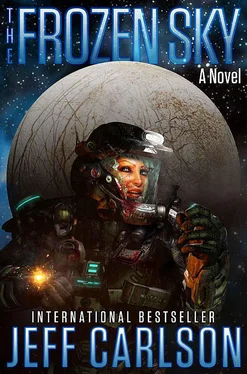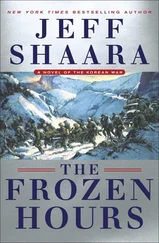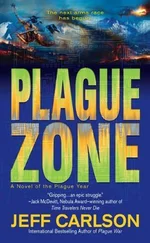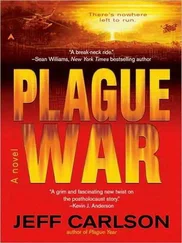She wasn’t as graceful as the mecha. The passage dropped steeply. Misjudging the gravity, she tended to bash into the ceiling. Then the opening shrank until it wasn’t much bigger than her suit. Again and again, Vonnie was forced to drop to her knees or roughly shoulder through.
Her telemetry betrayed them. The men on the radio questioned her movement and ordered her back. She kept going. Sonar showed an end to the tunnel after four hundred meters, yet infrared revealed that the end was a shade warmer than its surroundings. Hot pinpricks of gas were bleeding through.
“There’s something on the other side,” Vonnie said. “My sensors are going nuts.”
“Something alive?” Lam asked.
“Stop,” the radio said. “Specialist Vonderach, acknowledge. You will comply.”
“Roger that,” she said. “But this is an air lock. Look at it. It’s too smooth. It definitely isn’t a formation caused by melt or tidal pressures.”
She cringed at the idea of giving such responsibility to anything as flimsy as ice, but there were no metals here. What else could the carvers use? It spoke again of their inventiveness and determination. She couldn’t wait to see more.
Opening the end of the tunnel was a chance to show her worth to the team. To get through without losing the air, Vonnie would need to trap herself between the lock and a new seal of her own making — and every surface in the ice showed old scars and stubs. Irregular holes marred the walls where building material had been dug out and replaced.
“I say ’go,’” Lam told the men on the radio. “We’re picking up too many readings. Noise. Heat. We could miss something significant if we sit here.”
“I can get us in,” Vonnie said.
The debate among the high-gee ships was maddening. The Brazilians wanted her to withdraw. So did Naomi Harada, the Japanese minister aboard the American craft.
“What if our guys listen to them?” Vonnie worried, but Lam said, “No, Brazil is doing our work for us. Watch. Nobody likes being told what to do.”
He predicted the chain of events flawlessly. The Brazilians were frustrated that they had none of their own people on Europa. Their demands for international unity were terse, even petty. They cited old grievances against NASA and the ESA. They called on China to support them.
Ignoring their objections, the leaders of the Chinese, American, and European space agencies reached a consensus: Vonnie should continue.
“Yes!” she said, pumping her fist in excitement.
Lam grinned at her like a kid.
They gathered near the air lock. Bauman was last in line, so Vonnie took control of Bauman’s suit, assembling frozen hunks in a stack and soldering the pile together with her laser finger on a minimum setting. “Slow work,” she apologized, not wanting to dull their energy.
Lam shrugged, running sims on his visor as he waited. “Think what the carvers used instead of a laser,” he said. “Body heat? Urine or saliva? There are organic contaminants everywhere.”
“Lots of DNA,” Bauman agreed happily.
At last they were sealed in. Vonnie eased through the original lock and saw another ice plug further on. Redundancy was good engineering, but she was disappointed to realize how many lifetimes it must have been since the carvers had visited the tunnel or even considered it important.
Long, long ago, the top of the next air lock had slumped open. Her suit analyzed the low-pressure atmosphere wafting past her as 98.9 percent nitrogen, a gas so inert that no creature could have evolved to burn it as an energy source. This seemed to be a dead area. Why bother to block it off?
“There’s nobody home,” Vonnie said.
“Knock knock.” Lam was cheerful, even buoyant, bumping her arm as he tried to look past.
“Maybe the air is bad because this tunnel is unused,” Vonnie said. “Oxygen could be their most closely guarded resource. They might control it with flood gates.”
No answer. Lam and Bauman were beyond listening to her, lost in the chatter of data. Their tiniest mecha had run ahead while others lingered to examine the ice. Lam especially was in his element, pulling files and fitting each perspective into a working whole.
Vonnie was eager, too, yet she meticulously rebuilt the locks behind them. Then she moved in front again.
After another eighty meters, the slanting tunnel dropped into a sink hole. The vent was encrusted with old melt. Across from her was a hollow of uncertain depth. Stalactites hung from the top of the shaft.
There had been a catastrophe, probably a belch of heat. If the carvers had built anything else in the area, it was gone, but Vonnie couldn’t feel sad.
She walked to the edge of the hole. Her sonar raced down the shaft like a fantastic halo, never reaching bottom. The hole appeared to drop for more than a kilometer, twisting, widening, and branching away.
Somewhere down there was the dark heart of Europa.
“Perfect,” Bauman said. “This sink hole is a natural cross-section through the ice. How far down can we take samples?”
“Give me a minute,” Vonnie said. It would be easy to secure a few bolts, play out a molecular wire, and let their mecha descend like spiders. She rifled through her tool kit.
“Huh,” Lam said, taking control of a burrower near Vonnie. The machine scooted away from her and joined him.
“What’ve you got?” she asked.
“I—”
Later, Vonnie played back their group feed. Cursing him, she understood. His radar had probed a swath of dirty ice in the tunnel wall. Most of the patches that interested him were impure. Some were stained with lava dust, others discolored like milk or glass.
He’d noticed a shell — a small, spiral shell lodged in the wall of the tunnel. It wouldn’t have looked unusual on any beach on Earth. On Europa, it was a treasure.
Lam’s suit had reported the shell’s position to their grid, but he couldn’t leave it alone. He needed to be involved. Under his guidance, marking the shell for retrieval, their burrower stabbed a radio pin into the wall.
The ice exploded with black rock.
Vonnie was standing beside the largest mass. Somehow that saved her. The burst of ice and rock knocked her upward, although she was snarled in her wire.
Bauman yelled once: “Lam, get back!”
There was probably no more than a quarter ton of debris stopped up behind the dust pack, a collection of gravel and stones that had gradually sunk into a loose, dangerous bulge. It weighed a thirteenth as much as it would have on Earth, but in this gravity, it splashed.
It tore apart the sink hole. Other veins of rock caused a vicious swell. The heap rose, spread, and settled again like a cloud.
Vonnie escaped the worst shockwave, half-conscious and confused. She was thrown to the top of the vent as her friends disappeared. Their sharecasts clamored with alarms and one massive injury report before their suits went dark. But she was tied to the wire, and it would not break. One end caught in the heaving ice.
Then the avalanche took her, too.

The first pocket world in the ice would always be her favorite. It was inhabited by two peaceful species of bugs which were related to each other, yet were unlike the fat-bodied ants brought up by the ESA rover. They seemed to feed solely on the gray bacterial mats that grew alongside the wells of a hot spring, where the melt was thick and ever-changing.
Once upon a time, this chamber must have been part of more expansive catacombs. Ice-falls had long since closed it off. Vonnie had only stumbled into this dripping space when she refused to be deterred and started digging.
Читать дальше













